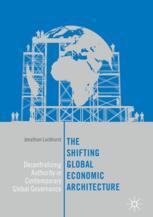

Most ebook files are in PDF format, so you can easily read them using various software such as Foxit Reader or directly on the Google Chrome browser.
Some ebook files are released by publishers in other formats such as .awz, .mobi, .epub, .fb2, etc. You may need to install specific software to read these formats on mobile/PC, such as Calibre.
Please read the tutorial at this link. https://ebooknice.com/page/post?id=faq
We offer FREE conversion to the popular formats you request; however, this may take some time. Therefore, right after payment, please email us, and we will try to provide the service as quickly as possible.
For some exceptional file formats or broken links (if any), please refrain from opening any disputes. Instead, email us first, and we will try to assist within a maximum of 6 hours.
EbookNice Team

Status:
Available4.7
18 reviewsThis book analyzes the shifting global economic architecture, indicating the decentralizing authority in global economic governance since the Cold War and, especially, following the 2008-09 global financial crisis. The author examines recent adjustments to the organizational framework, contestation of policy principles, norms, and practices, and destabilizing actor hierarchies, particularly in global macroeconomic, trade, and development governance. The study's ‘analytical eclecticism’ includes a core constructivist IR approach, but also incorporates insights from several international relations theories as well as political and economic theory. The book develops a unique ‘analytical matrix’, which analyzes effects of strategic, political, and cognitive authority in the organizational, policy, and actor contexts of the global economic architecture. It concludes that, despite concerns about potential fragmentation, decentralizing authority has increased the integration of leading developing states and new actors in contemporary global economic governance.